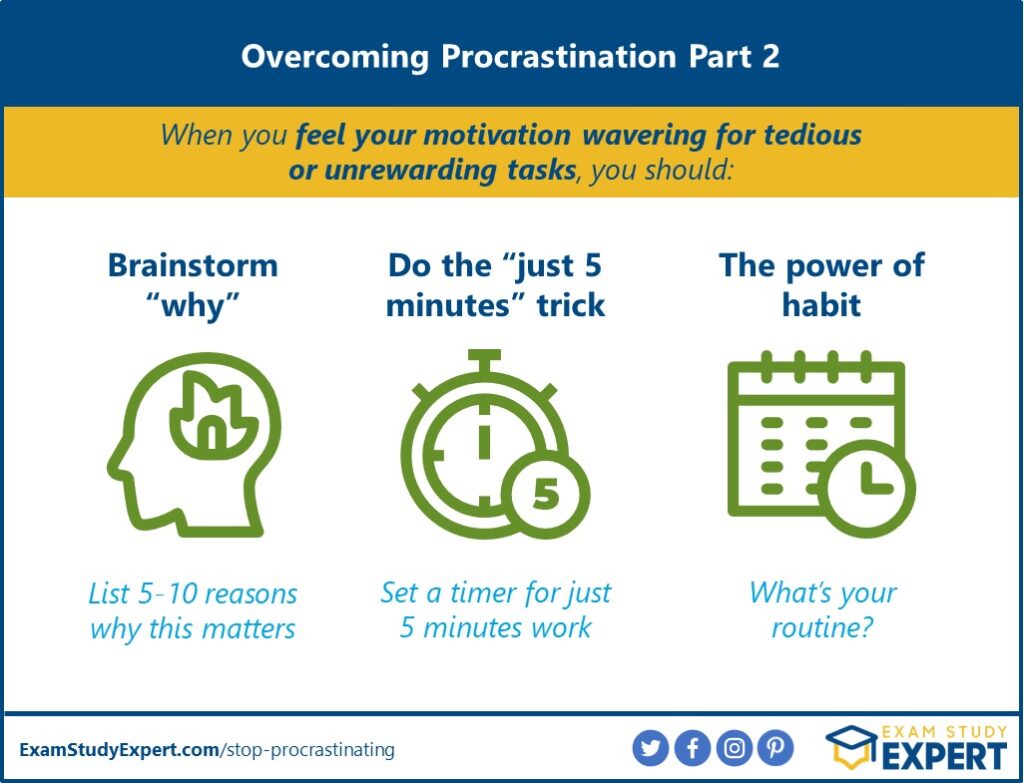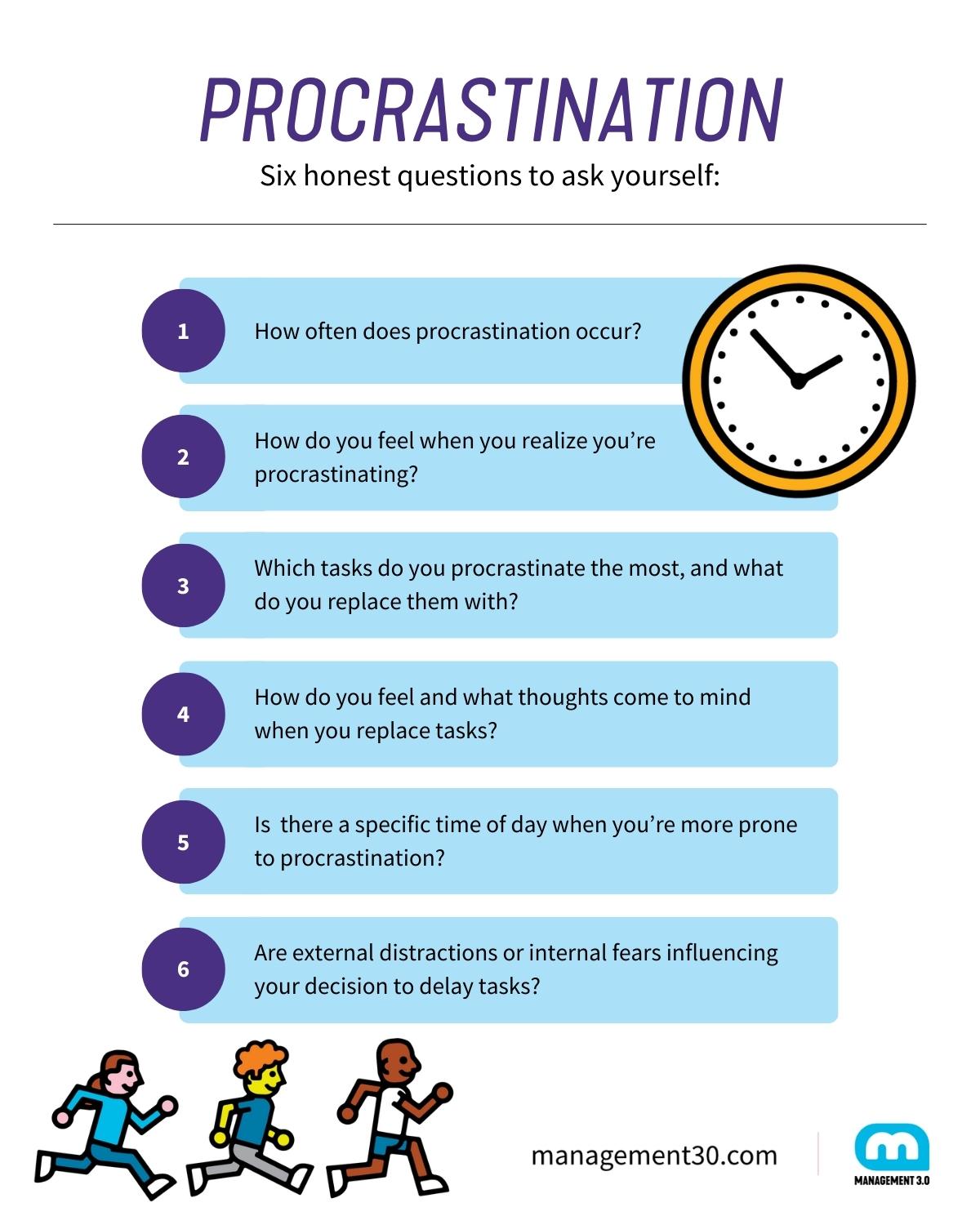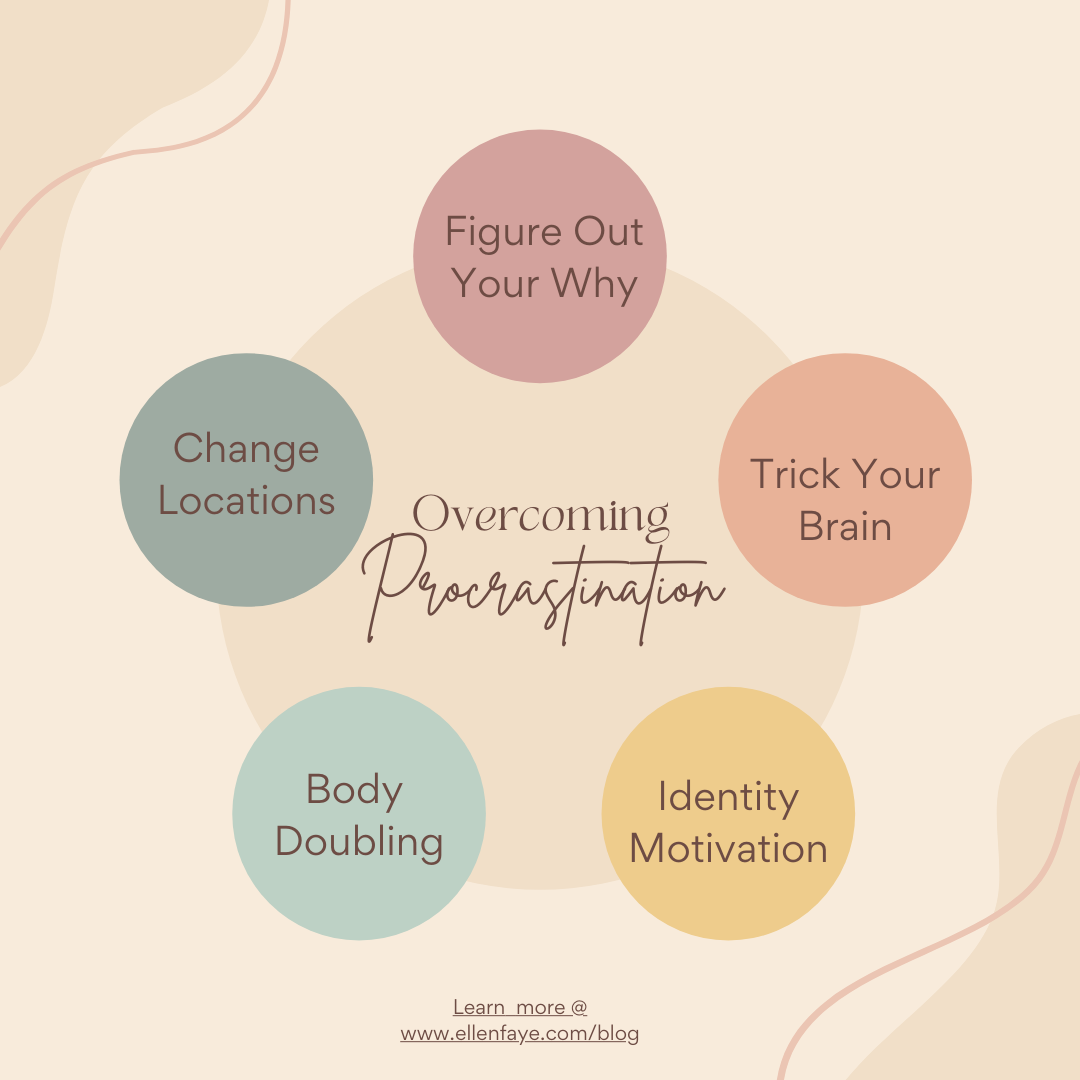Overcoming Procrastination: Strategies That Work
To overcome procrastination, break tasks into smaller steps and set specific deadlines. Stay consistent and manage distractions effectively.
Procrastination affects productivity and can lead to stress. Breaking tasks into smaller, manageable steps can make them less daunting. Setting specific deadlines helps create a sense of urgency. Consistency is key; work on tasks daily to build momentum. Managing distractions, such as turning off notifications, can help maintain focus.
By implementing these strategies, you can improve efficiency and achieve goals. Procrastination can be tackled with the right approach. Stay committed, and you will notice significant improvements in your productivity and overall well-being.
Understanding Procrastination
Procrastination can be a major roadblock to productivity. Understanding why we procrastinate is the first step towards overcoming it. This section delves into what procrastination is and its common causes.
What Is Procrastination?
Procrastination is the act of delaying tasks. This often leads to stress and missed deadlines. It is a habit that can be hard to break. Procrastinators often choose fun activities over important tasks. This creates a cycle of guilt and anxiety.
Below is a brief table to summarize procrastination:
| Aspect | Description |
|---|---|
| Definition | Delaying important tasks |
| Effects | Stress, missed deadlines |
| Cycle | Fun activities over tasks, guilt |
Common Causes
Many factors lead to procrastination. Fear of failure is a major cause. People delay tasks to avoid failing. Perfectionism also plays a role. Some people wait until everything is perfect before starting. Lack of motivation is another cause. Without a clear goal, tasks seem unimportant.
Here are some common causes in bullet points:
- Fear of failure
- Perfectionism
- Lack of motivation
Understanding these causes is crucial. It helps in finding effective strategies to overcome procrastination.

Credit: www.youtube.com
Impact On Life
Procrastination affects many areas of life. It can harm mental health, career, and academics. Understanding these impacts can motivate change.
Mental Health Effects
Procrastination often leads to stress and anxiety. People worry about unfinished tasks. This constant stress can cause depression.
Low self-esteem is another consequence. Feeling unproductive lowers confidence. This can create a negative cycle.
Career And Academic Consequences
In the workplace, procrastination impacts job performance. Deadlines are missed, and quality suffers. This can lead to job loss or missed promotions.
Students also face consequences. Procrastination leads to poor grades. Last-minute cramming is not effective. It also reduces learning retention.
| Impact | Consequences |
|---|---|
| Mental Health | Stress, Anxiety, Depression, Low Self-Esteem |
| Career | Missed Deadlines, Poor Performance, Job Loss |
| Academics | Poor Grades, Ineffective Learning, Reduced Retention |
Identifying Triggers
Procrastination affects many individuals. Understanding what triggers procrastination helps in overcoming it. By identifying triggers, one can develop strategies to stay focused and productive.
Personal Triggers
Personal triggers are unique to each person. They may arise from specific thoughts or emotions.
- Fear of failure: Some people procrastinate because they fear they might fail.
- Perfectionism: Wanting everything to be perfect can cause delays.
- Low motivation: Lack of interest in a task leads to procrastination.
- Overwhelm: Feeling overwhelmed by the size of a task makes it hard to start.
Environmental Triggers
Environmental triggers are external factors that lead to procrastination. Adjusting your surroundings can help reduce these triggers.
| Trigger | Description |
|---|---|
| Distractions | Noise, social media, and interruptions can distract you. |
| Workspace | An unorganized space makes it hard to focus. |
| Availability | Easy access to entertainment can lead to procrastination. |
Identifying and addressing these triggers helps in creating a productive environment.
Setting Clear Goals
Overcoming procrastination starts with setting clear goals. Clear goals give direction and purpose. They help you focus on what needs to be done. This section will explore effective strategies for setting clear goals.
Smart Goals
SMART goals are specific, measurable, achievable, relevant, and time-bound. These goals provide a clear roadmap to success. Here’s how to set SMART goals:
- Specific: Define the goal in detail.
- Measurable: Ensure the goal can be tracked.
- Achievable: Set a goal that is realistic.
- Relevant: Align the goal with your priorities.
- Time-bound: Set a deadline to complete the goal.
Example of a SMART goal: “Write a 1000-word blog post on overcoming procrastination by Friday.”
Breaking Tasks Into Steps
Big tasks can feel overwhelming. Break them into smaller, manageable steps. This makes the task less daunting. Here’s a simple table to illustrate:
| Task | Steps |
|---|---|
| Write a Blog Post |
|
Breaking tasks into steps makes them easier to tackle. It gives you a sense of progress and reduces procrastination.
Time Management Techniques
Overcoming procrastination often begins with effective time management techniques. These methods help you organize tasks and increase productivity. Below, we explore two popular time management techniques: The Pomodoro Technique and Time Blocking.
The Pomodoro Technique
The Pomodoro Technique is a simple yet powerful method. It breaks work into short, focused intervals. Each interval is called a “pomodoro.” Typically, a pomodoro lasts for 25 minutes. After each pomodoro, take a 5-minute break. After completing four pomodoros, take a longer break.
This technique helps maintain high levels of focus. It also reduces burnout by incorporating regular breaks. Here’s a basic outline:
- Choose a task you need to complete.
- Set a timer for 25 minutes.
- Work on the task until the timer rings.
- Take a 5-minute break.
- Repeat steps 1-4 four times, then take a longer break.
Using the Pomodoro Technique can make large tasks more manageable. It also creates a sense of urgency and motivates you to start.
Time Blocking
Time Blocking involves dividing your day into blocks of time. Each block is dedicated to a specific task or activity. This helps you allocate your time efficiently and ensures that important tasks are not overlooked.
| Time Block | Task |
|---|---|
| 8:00 AM – 10:00 AM | Email and Meetings |
| 10:00 AM – 12:00 PM | Project Work |
| 12:00 PM – 1:00 PM | Lunch Break |
| 1:00 PM – 3:00 PM | Client Calls |
| 3:00 PM – 5:00 PM | Project Work |
Time blocking helps you stay focused on one task at a time. It reduces the distractions and multitasking that lead to procrastination. By assigning a specific time for each task, you create a structured schedule. This makes it easier to start and complete tasks without delay.
These time management techniques can transform how you work. Give them a try and see how they help you overcome procrastination.

Credit: examstudyexpert.com
Building Motivation
Procrastination often stems from a lack of motivation. To beat procrastination, you need to build motivation. This section will help you understand different motivation types and how to use reward systems.
Intrinsic Vs Extrinsic Motivation
Intrinsic motivation comes from within you. It involves doing tasks because they are enjoyable or fulfilling.
Extrinsic motivation involves external rewards. These can be money, praise, or other incentives.
| Intrinsic Motivation | Extrinsic Motivation |
|---|---|
| Enjoying the task itself | Receiving a reward |
| Personal satisfaction | Approval from others |
| Learning new skills | Getting paid |
Reward Systems
Setting up a reward system can help build motivation. Here are steps to create an effective reward system:
- Identify the task you need to complete.
- Decide on a reward that excites you.
- Break the task into smaller steps.
- Reward yourself after completing each step.
Use both small and large rewards. Small rewards can be a short break or a snack. Large rewards can be a day off or a special treat.
Cognitive Behavioral Approaches
Overcoming procrastination can be a tough challenge. One effective method is using Cognitive Behavioral Approaches. These strategies focus on changing your thoughts and behaviors. They help you take action and stay productive.
Challenging Negative Thoughts
Negative thoughts often lead to procrastination. You might think, “I can’t do this” or “It’s too hard.” These thoughts stop you from starting tasks.
To combat this, challenge these negative thoughts. Ask yourself:
- Is this thought true?
- What evidence do I have?
- What would I tell a friend in this situation?
Replace negative thoughts with positive ones. Instead of “I can’t do this,” say, “I can try my best.” This shift in mindset can motivate you to start.
Behavioral Activation
Another effective strategy is Behavioral Activation. This involves taking small steps to complete tasks.
Start with a simple task. Break it into smaller, manageable steps:
- Write down the task.
- Identify the first step.
- Set a timer for 10 minutes.
- Work on the task until the timer goes off.
Use a table to track your progress:
| Task | First Step | Time Spent |
|---|---|---|
| Write a report | Outline the sections | 10 minutes |
| Clean the kitchen | Clear the counter | 10 minutes |
Small steps make big tasks seem easier. This approach helps you build momentum and stay focused.

Credit: management30.com
Seeking Support
Overcoming procrastination can be challenging, but seeking support can make a difference. Having someone to help can keep you on track and motivated. Here, we explore two effective strategies: accountability partners and professional help.
Accountability Partners
An accountability partner is someone who checks on your progress. They ensure you stick to your goals. This person can be a friend, family member, or colleague.
Regular check-ins with your partner can keep you focused. You can set weekly or daily goals. Discuss your progress and any challenges you face.
- Choose someone reliable who will hold you accountable.
- Agree on specific goals and deadlines.
- Be honest about your progress and setbacks.
Having an accountability partner can create a sense of responsibility. This can push you to complete tasks on time.
Professional Help
Sometimes, you may need professional help to overcome procrastination. Professionals like therapists or coaches can provide strategies tailored to your needs.
Therapists can help you understand the root cause of procrastination. They can offer techniques to manage it. Coaches can help you set realistic goals and create action plans.
| Professional | Benefits |
|---|---|
| Therapist | Understands emotional and psychological factors |
| Coach | Helps with goal-setting and action plans |
Both professionals can offer valuable support. They can help you develop skills to stay productive.
Seeking support from others can significantly impact your ability to overcome procrastination. Whether through an accountability partner or professional help, having someone to guide you can make the journey easier.
Creating A Proactive Environment
Creating a proactive environment helps you overcome procrastination. It sets you up for success and boosts productivity. Let’s explore practical steps to achieve this.
Organizing Workspace
A cluttered workspace can lead to a cluttered mind. Start by decluttering your desk. Remove unnecessary items and keep only essential tools. This creates a clean and focused workspace.
Use storage solutions like drawers and organizers. Label everything to find items quickly. Make sure your workspace is comfortable. Adjust your chair and monitor to avoid strain.
| Action | Benefit |
|---|---|
| Declutter Desk | Boosts Focus |
| Use Organizers | Reduces Time Wasted |
| Adjust Chair | Improves Comfort |
Minimizing Distractions
Distractions steal your time and focus. Identify common distractions and eliminate them. Use noise-canceling headphones to block out noise. Turn off notifications on your phone and computer.
Set specific times to check emails and messages. This prevents constant interruptions. Create a designated workspace away from distractions. Inform family or roommates about your work hours to minimize interruptions.
- Use noise-canceling headphones
- Turn off notifications
- Check emails at specific times
- Create a distraction-free workspace
- Inform others of your work schedule
By organizing your workspace and minimizing distractions, you create a proactive environment. This helps you stay focused and productive.
Conclusion
Conquering procrastination is possible with the right strategies. Implement these tips to boost productivity and achieve goals. Remember, small steps lead to significant progress. Stay committed and watch your efficiency soar. Embrace these tactics and transform your habits for a more productive life.
Start today and make a positive change.






